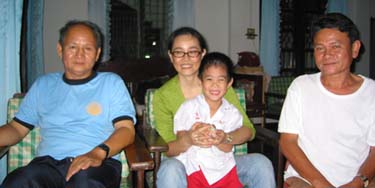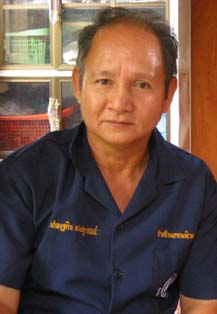|
“Man of Peace” In Luke 10:5-12 Christ sends out the seventy-two with the following words, We walked around San Pakow and were directed to the home of a man named Ajan Piew. He was very welcoming and willing to talk to us about Shan life and culture. Eventually he gave us a complete tour of the village and introduced us to many important members of the Shan community. Ajan Piew was our man of peace, a true gift from God. We hope you will be blessed as you read of the way God provided for our team in Chaing Rai. KEVIN: What do you do? AJAN PIEW: I am retired now. I was one of the first high school teachers (‘Ajan’ means teacher·it is a title). I have been a part of the push to extend the education to the 12th grade. Before, compulsory education was up to the 4th grade. Later, it was extended to the 6th grade. Now, the students are educated up to the 9th grade and we are in the process of extending that up to the 12th grade. This has been a problem especially for girls. They would be educated up to the 6th grade and then have nothing to do. Their parents would often sell them into slavery or prostitution. KEVIN: Where did you work? AJAN PIEW: I worked in the countryside in a small village outside of Chiang Rai. KEVIN: Where were you born? AJAN PIEW: Here. I have lived here all my life. My father is from Burma. Most people in this village are from Burma. At this point Ajan Piew suggested that we go talk to a man from the Shan State of Burma. His name is Louis. We walked with Ajan Piew to Louis’s house, but he was not home. So Ajan Piew introduced us to three elderly ladies. One was from Kengtung, Burma and told us her history of coming from Burma to Thailand. KEVIN: Tell us about leaving Burma and coming to Thailand. ELDERLY LADY: My parents came to Thailand because it was difficult to live in Burma. Things were economically better in Thailand. I am 78 years old and have been living in Thailand for about 70 years. STEVE: Can you tell us about Thai Yai culture and families? ELDERLY LADY: Thai Yai culture is the same as Thai culture. Most of the people from Burma that can remember Thai Yai culture are dead now. Over the next couple days Ajan Piew continued to introduce us to many people.
[This interview was conducted on July 16th, 2002.]
|
|




